La Dependencia de Apoyo a la Mediación (DAM) del Departamento de Asuntos Políticos y de Consolidación de la Paz (DAPCP) actúa como centro de coordinación de todo el sistema de las Naciones Unidas en relación con el apoyo a la mediación y los conocimientos especializados necesarios. Entre otras cosas, la DAM presta apoyo operativo adaptado a los procesos de paz y diálogo a través de su propio personal experto y del Equipo de Reserva de Asesores Superiores sobre Mediación.
Qué hacemos
Las principales competencias de la DAM incluyen la asistencia operativa en procesos de mediación y paz, la capacitación específica de los socios y la formulación de orientaciones, lecciones aprendidas y mejores prácticas en materia de mediación.
El personal de la DAM, que cuenta con expertos propios en cese al fuego, temas constitucionales, y el diseño de procesos, puede prestar apoyo adaptado durante las fases de planificación, implementación y evaluación de un proceso de mediación. Esta dependencia también gestiona el Equipo de Reserva de Asesores Superiores sobre Mediación, que puede movilizarse como capacidad complementaria de apoyo a la mediación.
La DAM organiza una serie de actividades emblemáticas de formación, como el curso de alto nivel de las Naciones Unidas sobre mediación, el curso de mediación del cese al fuego y el curso sobre las mujeres en las negociaciones de cese al fuego. Además, desarrolla y mantiene orientaciones y recursos para mediadores. Esto incluye una base de datos de acuerdos de paz que permite a los mediadores comparar el lenguaje utilizado en más de 75.000 disposiciones de 1.300 acuerdos. Previa petición, también proporciona a las misiones sobre el terreno orientaciones personalizadas, que a menudo incluyen análisis comparativos de casos.
La DAM colabora frecuentemente con diversas organizaciones regionales. También es miembro de varias redes de mediación, como el Grupo de Amigos de la Mediación y la Red de Apoyo a la Mediación, y colabora regularmente con la Alianza Global de Redes Regionales de Mujeres Mediadoras.
La capacidad de apoyo a la mediación del DAPCP depende principalmente de la financiación que recibe del Llamamiento Plurianual, incluso para hacer posible el apoyo sobre el terreno a las conversaciones de paz. Mantener esta financiación permitirá a la DAM continuar desplegando expertos de apoyo operativo allí donde sea necesario y desarrollar enfoques innovadores y orientaciones sobre mediación en campos emergentes como las tecnologías digitales, el clima, la mediación local y subnacional, y la agenda sobre juventud, paz y seguridad.
Global

Prestamos apoyo a la mediación en 25-30 contextos de país al año
Flexible

Prestamos apoyo a una amplia variedad de esfuerzos de prevención de conflictos, diálogo, mediación, e implementación de acuerdos de paz a distintos tipos de mediadores.
Rápida

Podemos desplegar expertos de alto nivel en mediación en las 72 horas siguientes a la recepción de una solicitud
Innovadora e inclusiva

Incorporamos la perspectiva de género y la inclusión en nuestro asesoramiento y utilizamos enfoques innovadores que responden a los retos de los conflictos contemporáneos
Ampliar nuestros conocimientos y ayudar a otros a aprender
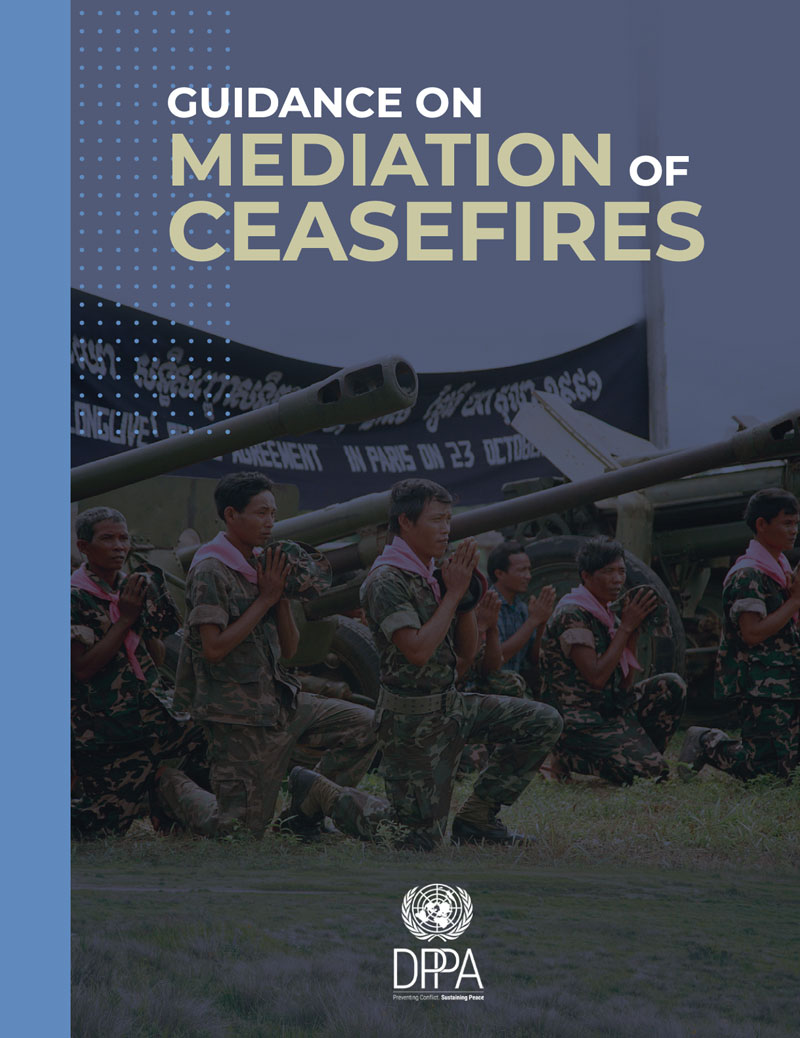
Esta Guía está pensada como apoyo a los altos dirigentes y al personal de las Naciones Unidas, a los mediadores y facilitadores de las Naciones Unidas y externos, así como a sus equipos, a las partes en conflicto, a los representantes de los Estados y de las organizaciones regionales, a las organizaciones no gubernamentales nacionales e internacionales, a los grupos de mujeres y a otras partes interesadas de los procesos de paz.
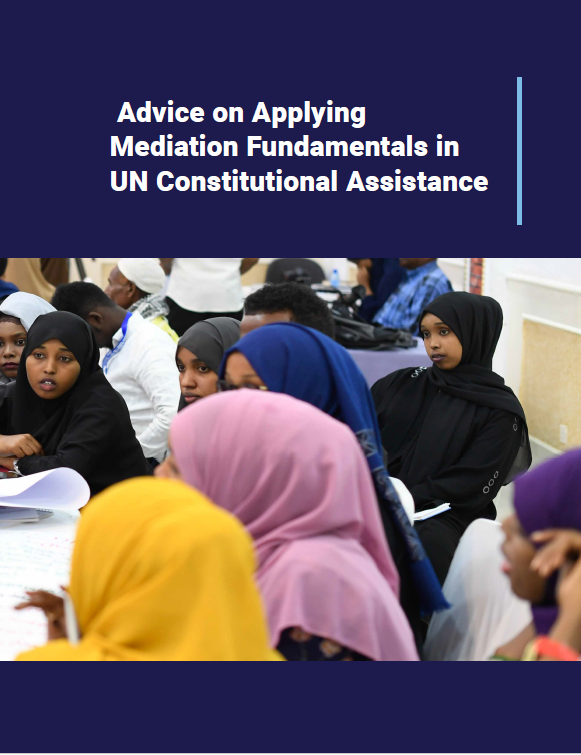
This paper captures key lessons learned in the author's two-year secondment to the Department of Political and Peacebuilding Affairs (DPPA) Policy and Mediation Division, Mediation Support Unit, during which the author supported constitution-making processes and provided advice on handling constitutional issues.
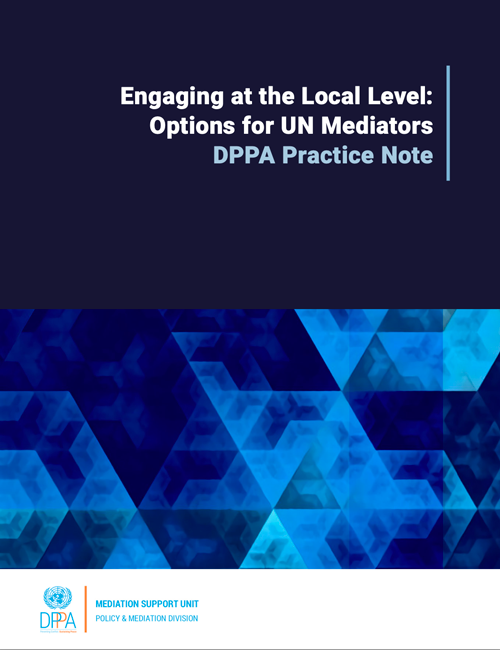
This Practice Note outlines circumstances under which more direct involvement with local conflicts and mediation processes might be strategically relevant for United Nations mediators working on national political processes.
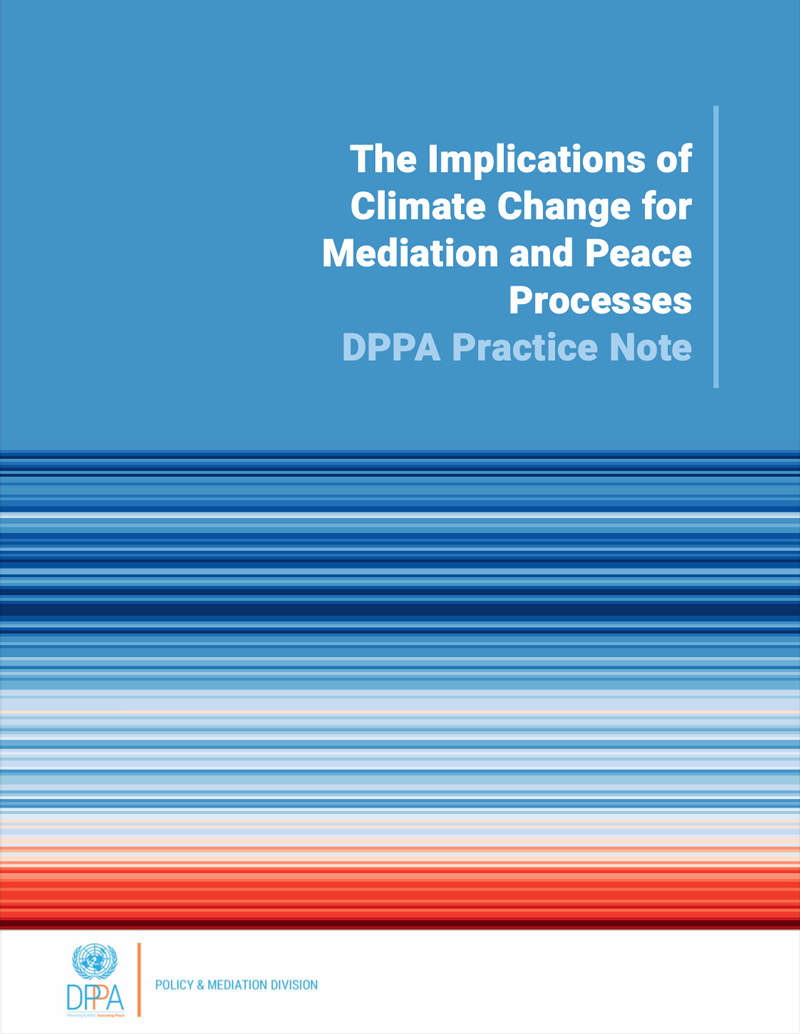
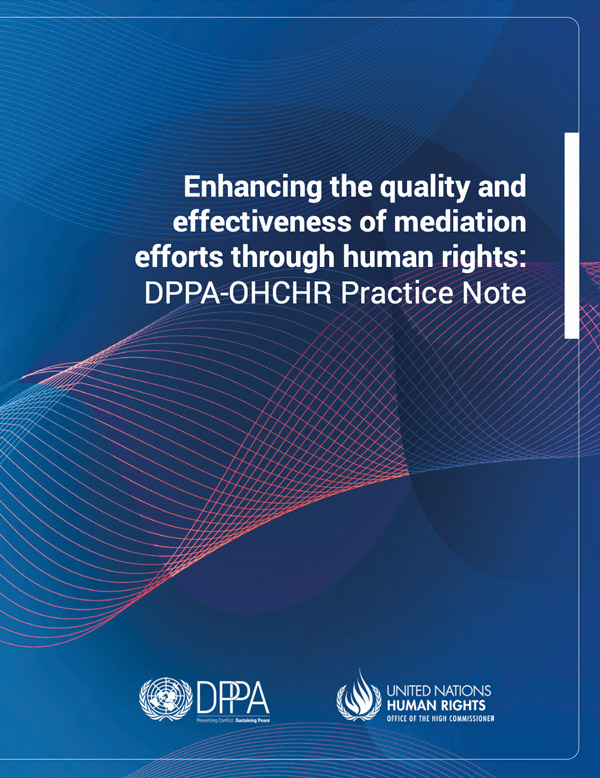
Esta nota práctica, fruto de la colaboración entre el DAPCP y la OACNUDH, indaga en estrategias prácticas y en ejemplos del mundo real para ayudar a los mediadores y profesionales de los derechos humanos a integrar los principios y consideraciones de derechos humanos en su trabajo en general y, en particular, en cada paso de los esfuerzos de mediación que realizan. La nota muestra que los derechos humanos ofrecen soluciones prácticas a muchas de las cuestiones difíciles que los mediadores intentan abordar.
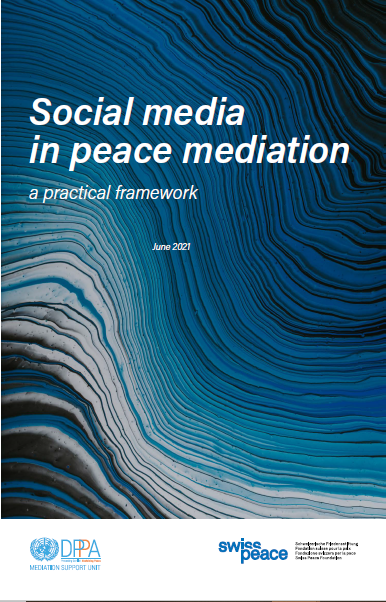
Produced jointly by DPPA Mediation Support Unit and swisspeace, this paper discusses the impact of social media on peace mediation, makes practical suggestions for mediators and their teams, and poses questions for further consideration and analysis. The paper also includes illustrative examples of practical social media uses.
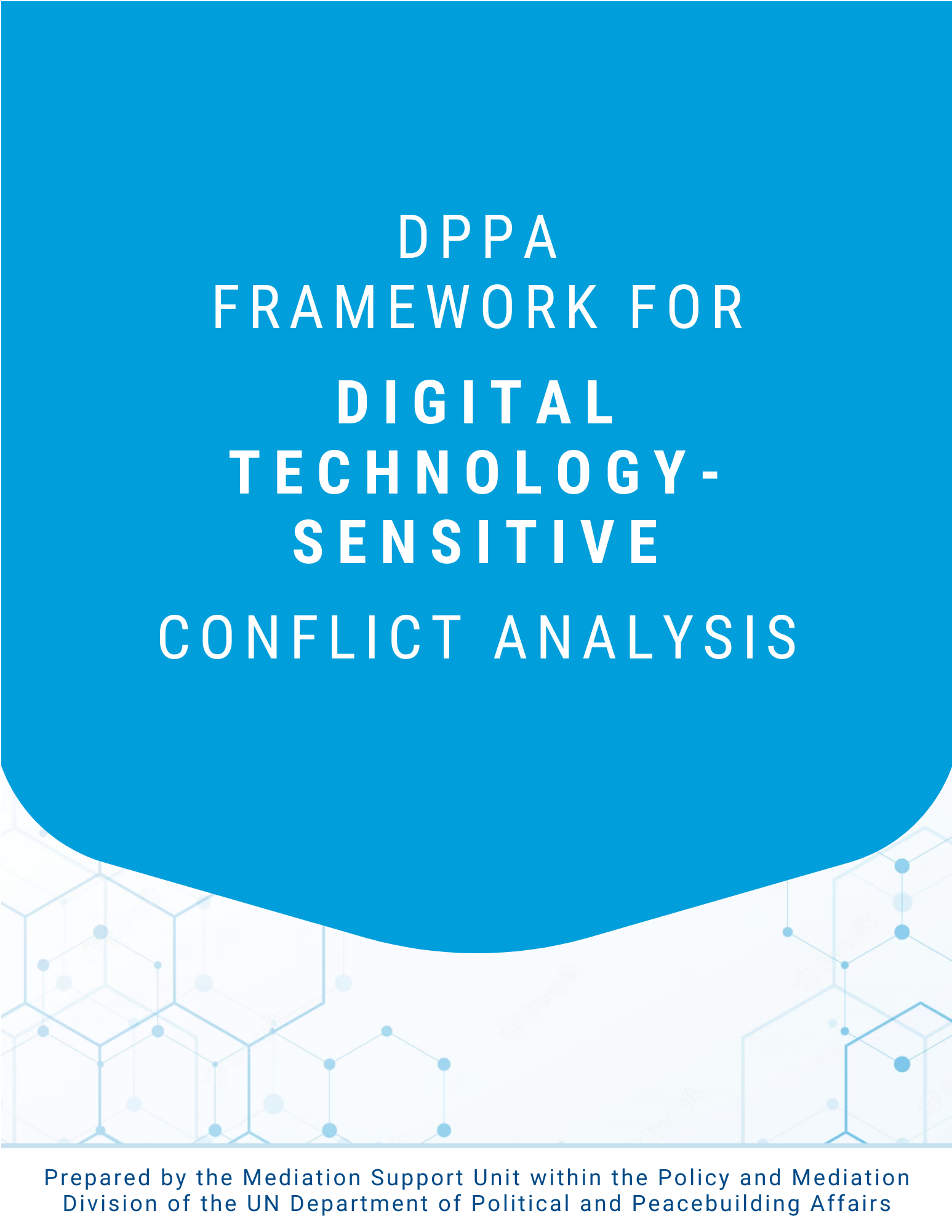
Digital technologies are also changing the character of conflict as parties increasingly rely on them to advance their objectives. Mediators and their teams need to consider additional factors such as the digital ecosystem of a given setting and how digital technologies and related data issues influence the power dynamics of a conflict. To address these new developments and help mediators and political affairs officers navigate the issues, the DPPA Policy and Mediation Division has prepared a Framework for Digital Technology-sensitive Conflict Analysis.
Visite la página de recursos para obtener más orientaciones, políticas y documentos prácticos sobre mediación.
Datos destacados de 2023

152 despliegues de personal/asesores
previa solicitud, para la asistencia en la mediación

131 misiones de apoyo a la mediación del Equipo de Reserva
en aproximadamente 28 contextos diferentes

Asesoramiento técnico y apoyo en materia de género e inclusión
proporcionado al 100 % de los procesos de paz liderados y coliderados por la ONU
Apoyo por temas en 2023
Apoyo por región en 2023
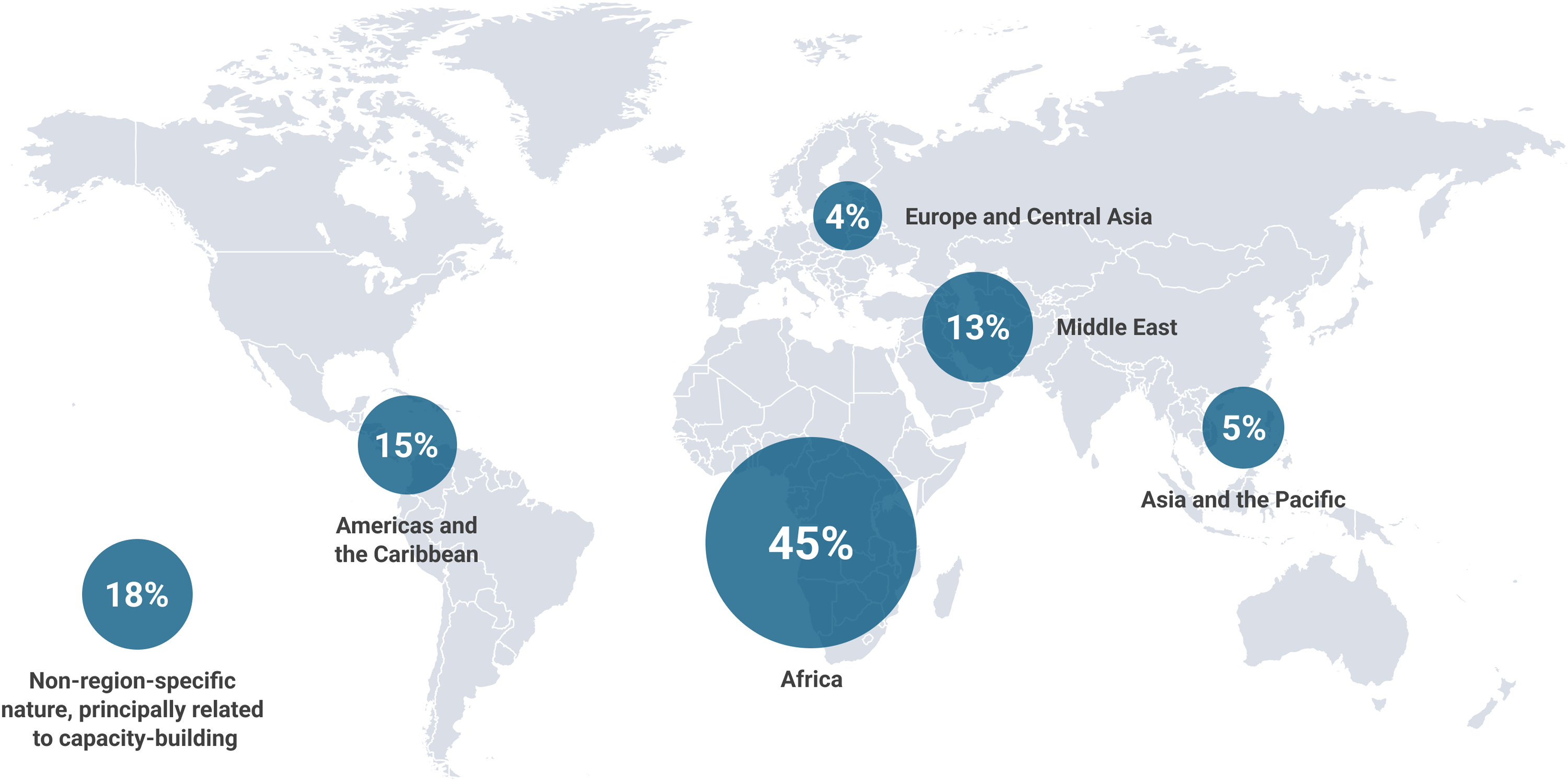

The Mediation Support Unit (MSU) in the Department of Political and Peacebuilding Affairs (DPPA) serves as the UN system-wide focal point on mediation expertise and support.
Panorama de las actividades actuales
Actualizado el 30 de septiembre de 2024
Chile
El DAM/Equipo de Reserva continuó brindando apoyo técnico al Gobierno de Chile a través de la Comisión Presidencial por la Paz y el Entendimiento, tras un despliegue en terreno en Santiago de Chile durante el trimestre anterior. En una reunión en línea con los miembros de la Comisión el 11 de julio, un experto en diseño de procesos del Equipo de Reserva presentó un resumen de observaciones contextuales y de procesos basado en experiencias internacionales comparadas. Esto incluyó recomendaciones para fortalecer el compromiso político con los grupos indígenas, así como modelos alternativos de mecanismos de diálogo local e infraestructuras para la paz.
Guatemala
El DAM/Equipo de Reserva continuó proporcionando apoyo remoto a la Presidencia de Guatemala durante las etapas preparatorias y de alcance de un proceso de diálogo para abordar el conflicto territorial histórico entre dos comunidades indígenas K'iché en el occidente del país. Un experto en diseño de procesos del Equipo de Reserva participó en una serie de discusiones estratégicas en línea con el equipo de facilitación de la Presidencia, ofreciendo insumos técnicos sobre cuestiones clave: cómo prevenir la violencia entre las comunidades, cómo promover un diseño de proceso inclusivo y la participación significativa de actores de la sociedad civil y mujeres, así como abordar el uso de redes sociales para la difusión de discursos de odio y desinformación.
Chipre
A principios de julio, un experto en diseño de procesos fue desplegado de manera remota a través del mecanismo del Equipo de Respuesta Rápida para apoyar a la Enviada Personal del Secretario General sobre Chipre, la Sra. María Ángela Holguín Cuéllar. Se brindó apoyo a la EPSG en el cumplimiento de su mandato, que incluye desempeñar un rol de buenos oficios en nombre del Secretario General para buscar un terreno común sobre el camino a seguir y asesorarlo en el tema de Chipre. A principios de 2024, el experto también acompañó a la EPSG Holguín durante dos visitas a la isla, incluyendo reuniones con líderes, representantes de la sociedad civil –incluidas mujeres y jóvenes– y otros actores clave
Europa del Este
A solicitud de la División de Europa y Asia Central (DEAC) del DAPCP-DPO, un experto del Equipo de Respuesta Rápida fue desplegado en septiembre para apoyar el Día Abierto 2024 para el Diálogo Regional sobre Mujeres, Paz y Seguridad (MPS), organizado por ONU Mujeres en colaboración con DAPCP y el Programa Conjunto PNUD-DAPCP en Chisinau, Moldavia. El evento reunió a unas 60 representantes de la sociedad civil de Ucrania, Moldavia y el Cáucaso Sur para compartir sus experiencias en la implementación de la agenda MPS en sus comunidades, países y la región. Las participantes también reflexionaron sobre enfoques inclusivos para la cohesión social, la mediación local y el apoyo a la unidad nacional, el diálogo y los esfuerzos de reconciliación. El experto del Equipo de Reserva ofreció insumos y reflexiones en el segmento plenario de la conferencia y facilitó sesiones de intercambio de experiencias con socias de la sociedad civil de Moldavia y Ucrania.
Yemen
Durante el trimestre más reciente, el personal de DAM, incluido su asesor en ceses al fuego y arreglos de seguridad, continuó apoyando a la Oficina del Enviado Especial del Secretario General para Yemen en la operativización de los compromisos de las partes, así como en el compromiso de la Oficina con un cese al fuego a nivel nacional y otros arreglos de seguridad.
República Democrática del Congo (RDC)
A solicitud de MONUSCO, un experto en diseño de procesos movilizado a través del mecanismo del Equipo de Respuesta Rápida finalizó el desarrollo de una hoja de ruta para el establecimiento de un mecanismo permanente de diálogo respaldado por el gobierno en la provincia de Ituri. La hoja de ruta se basó en los insumos de consultas facilitadas previamente por el experto en Bunia, capital de la provincia de Ituri, del 4 al 6 de junio de 2024. Las consultas reunieron a actores clave, incluidos líderes religiosos, tradicionales, mujeres y de la sociedad civil, actores políticos y parlamentarios, para recoger sus opiniones sobre una arquitectura para el mecanismo. Una vez establecido, el mecanismo tendrá el mandato principal de monitorear la implementación de acuerdos y compromisos de paz locales, prevenir conflictos, facilitar o mediar en la resolución pacífica de conflictos sociopolíticos y crear conciencia sobre los daños de los conflictos y los beneficios de la paz, la reconciliación nacional y la cohesión social.
Lesoto
A solicitud del Reino de Lesoto, un experto en diseño de procesos de DAM fue desplegado a principios de julio para ampliar el proceso de diálogo con el Colegio de Jefes, específicamente los jefes principales, todos ellos senadores en la cámara alta de la legislatura, y el poder ejecutivo del gobierno.
El despliegue fue el tercero de una serie de apoyos que DAM ha brindado a los esfuerzos nacionales de prevención de Lesoto. Esta interacción estuvo orientada a desarrollar capacidades para una visión compartida de estabilidad, progreso y prosperidad para el Reino, fortaleciendo la resiliencia nacional, las capacidades locales de mediación y los mecanismos para la cohesión social, incluyendo los problemas enfrentados por las regentes (jefas mujeres). Durante el diálogo, los Jefes también tuvieron la oportunidad de intercambiar con representantes del gobierno sobre cómo trabajarían juntos a nivel local en adelante.
Libia
DAM continúa apoyando a UNSMIL en la implementación de su mandato integral, particularmente en lo que respecta al diseño de procesos, ceses al fuego y arreglos de seguridad. En agosto de 2024, a solicitud de la Misión, DAM preparó un documento sobre lecciones aprendidas y ejemplos comparativos de compromisos de la Vía II y otros procesos consultivos amplios. Este documento alimentó discusiones de lluvia de ideas en curso en la Misión. DAM también desarrolló una nota informal sobre cómo las consultas digitales podrían complementar una posible iniciativa política, enumerando opciones, mecanismos y plataformas digitales que la Misión podría considerar.
Además, el asesor de DAM en ceses al fuego y arreglos de seguridad continuó dialogando con UNSMIL sobre los pasos a seguir después del taller de mayo de 2024 en Túnez para actores militares y de seguridad libios. Este taller discutió un código de conducta destinado a mejorar la provisión de seguridad, la protección de civiles y el respeto de los derechos humanos.
Sudán del Sur
DAM continuó brindando apoyo a UNMISS en la implementación de sus actividades mandatadas, incluido el apoyo a la transición política prevista en el Acuerdo Revitalizado sobre la Resolución del Conflicto en Sudán del Sur. Primero, a solicitud del Equipo de Constituciones de UNMISS, un experto en cuestiones constitucionales movilizado a través del mecanismo del Equipo de Respuesta Rápida ofreció una presentación en línea sobre diferentes modelos de federalismo. La presentación fue realizada ante varios actores sursudaneses, incluidos expertos constitucionales, formuladores de políticas y académicos en una conferencia organizada por la Universidad de Juba.
En segundo lugar, el experto en género e inclusión del Equipo de Reserva participó en la sexta reunión de reflexión organizada por la Fundación Friedrich-Ebert (FFE) para discutir las condiciones necesarias y los próximos pasos en la preparación de elecciones creíbles y pacíficas en Sudán del Sur.
Durante el último trimestre, DAM y la División de Asuntos Civiles de UNMISS también lanzaron un estudio destinado a desarrollar una comprensión más profunda de los factores que influyen en el éxito o fracaso de los acuerdos de paz locales en Sudán del Sur. Los hallazgos y recomendaciones de este estudio ofrecerán orientación a UNMISS para mejorar su capacidad de apoyar la negociación e implementación de acuerdos de paz locales sostenibles.
Sudan
Durante el período del informe, la División de África Oriental (DAO) del DAPCP-DPO y la Oficina del Enviado Personal del Secretario General para Sudán (OEPSG-Sudán) continuaron utilizando la experiencia de DAM y del Equipo de Reserva. De conformidad con la resolución 2736 (2024) del Consejo de Seguridad, el Enviado Personal del Secretario General (EPSG) Lamamra invitó a las partes sudanesas a participar en conversaciones de proximidad convocadas por la ONU para discutir medidas destinadas a garantizar la distribución de asistencia humanitaria y opciones para la protección de civiles en todo Sudán. El personal de DAM y los expertos del SBT formaron parte de un equipo técnico integrado de las Naciones Unidas que proporcionó experiencia en ceses al fuego, diseño de procesos, y género e inclusión. Las conversaciones de proximidad se llevaron a cabo del 11 al 19 de julio de 2024 en Ginebra, Suiza, e incluyeron 20 reuniones en las que los expertos facilitaron sesiones técnicas separadas con las delegaciones de las partes.
Esto fue seguido por dos reuniones: una Reunión Consultiva para Mejorar la Coordinación en Sudán y un Retiro de Planificación de Mediadores, organizados por el Ministerio de Relaciones Exteriores de la República de Yibuti los días 25 y 26 de julio. Estas reuniones estuvieron orientadas a mejorar la colaboración con los esfuerzos de paz impulsados por los estados miembros y las iniciativas regionales en Sudán. OEPSG-Sudán y un pequeño equipo de apoyo de la DAO, DAM y un experto en diseño de procesos del SBT viajaron a Yibuti para respaldar estos compromisos. Estos eventos de alto nivel ofrecieron valiosas oportunidades para obtener una comprensión más profunda de las posiciones regionales e internacionales sobre Sudán.
Posteriormente, Estados Unidos, con Arabia Saudita y Suiza como coanfitriones, inició conversaciones en Suiza el 14 de agosto con el objetivo de reunir a las partes sudanesas para discutir: (a) el cese de hostilidades, (b) monitoreo, verificación y cumplimiento, y (c) cuestiones humanitarias. La ONU asistió a las conversaciones como observadora, con el EPSG Lamamra liderando una delegación de la ONU (que incluyó al asesor principal de DAM en arreglos de seguridad). El experto de DAM participó en las reuniones y fue miembro del grupo de trabajo técnico encargado de promover el cumplimiento de las partes sudanesas con acuerdos previos, incluido el Acuerdo de Jeddah de 2023.
Además de estos compromisos formales de la Vía I, los expertos del SBT se desplegaron ampliamente para apoyar a diversos socios en temas de género e inclusión. Esto incluyó el despliegue del experto en género e inclusión del SBT de DAM para facilitar un Diálogo de Mujeres Sudanesas organizado por la UA e IGAD del 2 al 4 de julio, cuyo objetivo era construir consenso entre las participantes sudanesas. Durante el evento, las mujeres buscaron formular una posición común mínima y sensible al género que alimentara un diálogo político sudanés inclusivo planeado por la UA e IGAD. El experto facilitó sesiones con 70 mujeres y ayudó en el desarrollo de un comunicado que se presentó en la Reunión Preparatoria para el diálogo político inclusivo.
Por separado, el experto en ceses al fuego del SBT apoyó un taller sobre ceses al fuego para mujeres sudanesas organizado por CMI – Fundación de Paz Martti Ahtisaari, en Nairobi, Kenia, del 30 de agosto al 3 de septiembre. El taller reunió a mujeres de diversos grupos sudaneses para avanzar en su capacidad de acción política y su participación significativa en un proceso de negociaciones. El experto facilitó sesiones sobre opciones técnicas para un cese al fuego en Sudán.
Oficina de las Naciones Unidas para África Occidental y el Sahel (ONUAOS)
A solicitud de ONUAOS, DAM desplegó a un experto en diseño de procesos a través del mecanismo del SBT para cofacilitar un taller destinado a fortalecer la capacidad de los miembros de un propuesto Equipo de Respuesta Rápida (ERR) para Mujeres Mediadoras en África Occidental y el Sahel, así como representantes de redes de mujeres relevantes en habilidades de negociación, cabildeo, promoción y mediación. El taller se celebró en Somone, Senegal, del 10 al 12 de septiembre de 2024. La hoja de ruta adoptada al final del taller identificó posibles puntos de entrada para que el ERR apoye los esfuerzos de mediación en África Occidental y el Sahel.
Afganistán
Tras una reunión de Enviados Especiales sobre Afganistán y encuentros con la sociedad civil afgana, convocados por la ONU por tercera vez en Doha, Qatar, del 30 de junio al 2 de julio, DAM apoyó a la División de Asia y el Pacífico (DAP) del DAPCP y a la UNAMA en cuestiones de diseño de procesos y planificación para avanzar en el compromiso internacional con Afganistán de manera más coherente, coordinada y estructurada.
Papúa Nueva Guinea
DAM continuó brindando asesoramiento técnico al Coordinador Residente en Papúa Nueva Guinea y al DAP sobre el proceso de consultas posteriores al referéndum entre el Gobierno de Papúa Nueva Guinea y el Gobierno Autónomo de Bougainville (GAB). En un desarrollo significativo, el 10 de septiembre, las partes acordaron el nombramiento de un moderador independiente para ayudar a resolver los problemas pendientes sobre el futuro de Bougainville. Esto sigue a una decisión anterior de mayo, cuando las partes acordaron públicamente designar un moderador y solicitar el apoyo de la ONU para el proceso. En este contexto, DAM está asesorando a la Oficina del Coordinador Residente y al DAP sobre cómo las Naciones Unidas podrían apoyar al recién nombrado moderador, basándose en lecciones aprendidas y ejemplos comparativos de facilitación por terceros.
1. Compromisos en línea y presenciales de DAM (webinarios, paneles, consultas)
Durante el tercer trimestre, múltiples expertos del Equipo de Reserva y personal de DAM participaron en diferentes formatos de discusión virtual como panelistas, ponentes y moderadores. También actuaron como facilitadores expertos en diversos ejercicios de desarrollo de capacidades para la ONU y sus socios, incluyendo:
(i) un experto del Equipo de Reserva en diseño de procesos impartió una introducción de dos medias jornadas sobre fundamentos de mediación para participantes del programa de becas Beyond Borders Scotland 1325;
(ii) múltiples expertos del Equipo de Reserva asistieron y facilitaron sesiones del Curso sobre Mujeres en Negociaciones de Cese al Fuego de 2024 del DAPCP; y
(iii) DAM y un experto del Equipo de Reserva en diseño de procesos participaron en una sesión Brown Bag del DAPCP titulada “Lecciones del apoyo de la ONU a la Comisión Chilena para la Paz y el Entendimiento”.
2. Revisión de Medio Término del Equipo de Reserva
Del 9 al 10 de septiembre, durante dos mañanas consecutivas, el personal de DAM y los expertos del Equipo de Reserva se reunieron en línea para la Revisión de Medio Término de 2024 del Equipo de Reserva. La revisión brindó una oportunidad para evaluar los despliegues remotos y presenciales realizados hasta la fecha en 2024 y discutir temas seleccionados de apoyo a la mediación. Los puntos de la agenda incluyeron una discusión sobre el Compromiso Común para la Participación de las Mujeres en los Procesos de Paz y el Pacto para el Futuro, cómo la ONU puede contribuir a la pacificación en un espacio de mediación cada vez más multifacético, y una revisión del apoyo de DAM/Equipo de Reserva a los mediadores de los Estados Miembros.
3. Curso de Negociaciones de Cese al Fuego y Guía sobre Ceses al Fuego
La cuarta edición del Curso sobre Mujeres en Negociaciones de Cese al Fuego del DAPCP, organizado por las Unidades de Apoyo a la Mediación y Género, Paz y Seguridad, se lanzó el 3 de septiembre y continuará hasta el 6 de noviembre. El curso reúne a más de 30 mujeres, seleccionadas de más de 1,000 postulantes, que trabajan para gobiernos y la sociedad civil en contextos como Camerún, Colombia, Israel, Malí, Myanmar, Palestina, Somalia, Sudán del Sur y Sudán. Las participantes desarrollarán habilidades técnicas para participar de manera significativa en negociaciones e implementación de ceses al fuego. Una encuesta del curso realizada entre exalumnas indica que la mayoría utiliza las habilidades aprendidas en la construcción de paz, mediación y monitoreo de ceses al fuego.
Por separado, la versión en ruso de la Guía sobre Mediación de Ceses al Fuego del DAPCP fue lanzada el 7 de agosto. Desde el lanzamiento de la versión en inglés de esta guía en septiembre de 2022, también se han publicado versiones en árabe, francés y español.
4. Grupo de Amigos de la Mediación
El Grupo de Amigos de la Mediación celebró su 14ª Reunión Ministerial al margen del 79º período de sesiones de la Asamblea General de las Naciones Unidas el 26 de septiembre, bajo el tema “Mantener el rumbo: Reforzar la mediación en un entorno de conflictos cambiante”. La reunión fue copresidida por la Ministra de Relaciones Exteriores de Finlandia, S.E. Elina Valtonen, y el Ministro de Relaciones Exteriores de la República de Turquía, S.E. Hakan Fidan. Las palabras clave fueron pronunciadas por Rosemary DiCarlo, Secretaria General Adjunta para Asuntos Políticos y de Consolidación de la Paz. Los participantes reafirmaron su compromiso con la promoción y el avance de la mediación. También apoyaron el llamado de los Copresidentes para reforzar la mediación como la principal herramienta de resolución de conflictos en un contexto global cambiante. Durante la reunión, la SGA DiCarlo anunció que en el próximo Debate Abierto del Consejo de Seguridad sobre mujeres, paz y seguridad en octubre, el Secretario General tiene la intención de lanzar un “Compromiso Común sobre la Participación de las Mujeres en los Procesos de Paz” por parte de actores globales de mediación. Al respaldar el Compromiso Común, los Estados Miembros, organizaciones regionales y otros actores de mediación se comprometerían a tomar medidas concretas sobre la participación de las mujeres en todos los procesos de paz en los que participen.
5. Derechos Humanos y Mediación
La nota práctica conjunta del DAPCP-OACNUDH sobre derechos humanos y mediación, titulada “Mejorando la calidad y efectividad de los esfuerzos de mediación a través de los derechos humanos” ha sido traducida al árabe, inglés, francés y español (disponible aquí). Se ha publicado una nueva página en Peacemaker sobre Justicia Transicional, reconciliación y derechos humanos, que incluye un compendio de documentos clave de orientación y notas informativas emitidos por la ONU en los últimos veinte años para ayudar a abordar estos temas desafiantes.
